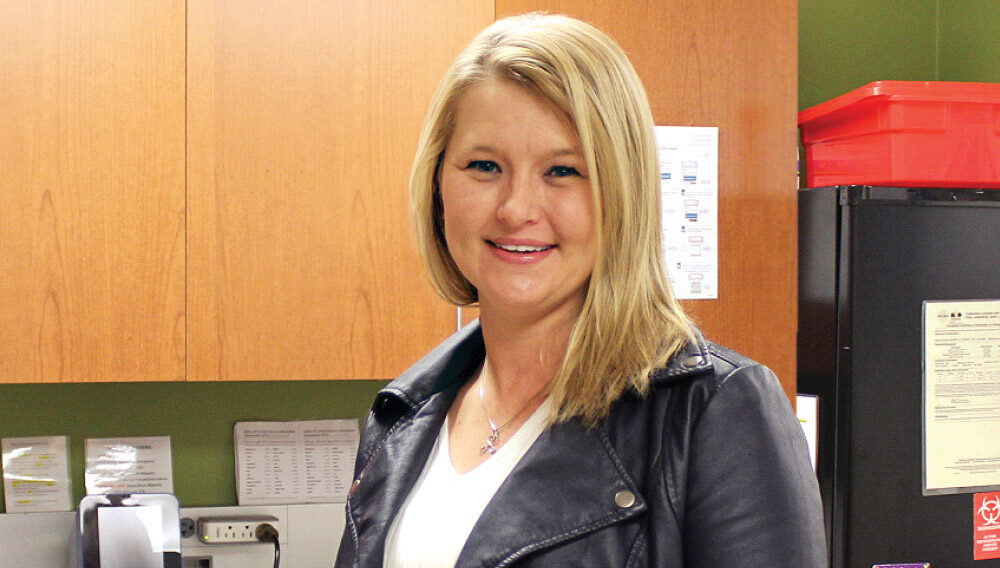Community Care

Jenny Wensink Goes Back to School to Help People in Need
In these difficult and changing times, the last thing people want to worry about is whether their family members can see a doctor. Many people are forgoing a doctor’s appointment for an illness or a routine checkup because they can’t afford it during the COVID-19 pandemic. Luckily, community health centers are open to provide people with the care they need at little or sometimes no expense. Excelsior College student Jenny Wensink, of Sheboygan, Wisconsin, is dedicated to making sure people in her community get the care they need at Lakeshore Community Health Center, where she is the medical program manager.
“I feel strongly about people being able to access care. I know how expensive medical care is even if you have insurance, and so the mission for our health center is that we provide access to care regardless of your ability to pay,” says Wensink, who is pursuing a Bachelor of Science in Health Sciences. Lakeshore Community Health Center in Sheboygan runs in part thanks to federal grants and has programs in place to provide financial discounts for patients who qualify. If they meet certain criteria and are willing to share personal information, they can receive quality care for dental exams, women’s health, mental health, routine checkups, and more at little or no cost.
As medical program manager, one of Wensink’s responsibilities is running the center’s vaccine program at the two locations, in Sheboygan and Manitowoc. This involves mentoring and teaching staff about vaccines and how to administer them, which is something she is passionate about. Many families may not have their children vaccinated because of the cost. Wensink partnered with a medical assistant who was successfully operating a previous vaccine program and together they serve as members of the local immunization coalition. “We work with other health care providers and other health systems and really get the word out about how important it is,” she says, referring to vaccinations for children.
Wensink also works closely with behavioral health consultants who serve as an extension of the medical providers. They assist patients seeking mental health support, needing traditional therapies, looking for help with medication compliance issues, and more. “We’re trying to take the stigma out of mental health. So, we have found that if we add these behavioral health counselors into our medical team, our patients are more likely to receive the mental health services that they need,” says Wensink.
Patients have been able to continue to receive their mental health and other types of treatment during the pandemic. To administer COVID-19 testing and to see sick patients, the center constructed an acute care center in a two-story garage on its property. Staff also instituted telehealth services and can speak to patients by video or telephone. Wensink’s responsibilities have not changed too much during the pandemic, but she helps enforce the need for personal protective equipment and also participates in local health committee meetings.
Wensink has a strong passion for helping others, something that has been a part of her since she was young. Wensink was previously the medical assistant supervisor and she realized she wanted to do more for the people who came to the center for care. After being promoted to medical program manager, she decided to go back to school for a bachelor’s degree. “It wasn’t requested of me, but I believe in lifelong learning. It’s really important and there’s so much more that I probably could give if I just had a little bit more education,” she says.
Wensink learned about Excelsior when she checked the message boards on the American Association of Medical Assistants website. “I noticed through the AAMA that they were partnering with Excelsior and that my credits would all transfer, but I also would get some discounted tuition. And I was like, well, how can that be bad?” she says. Most of her credits transferred, which was a big plus because it meant Wensink didn’t need to retake any courses. “I felt like ‘hey, I’m kind of halfway through this already.’ It made it seem more doable.”
At first, going back to school was difficult because Wensink had not been in school for many years and she was concerned about paying for college while her two daughters were also in college. She also had to learn good time management skills quickly. She soon realized her classmates were all in the same boat—working full-time with families and other responsibilities. Now, she is over a year into the bachelor’s of health sciences program.
So far, many of the management skills Wensink has learned have transferred to her job and they have enabled her to connect with her staff more effectively. She is also able to communicate better with other team members thanks to her interpersonal and management courses. This fits right in line with the culture at Lakeshore Community Health Center, which supports building strong work relationships.
By earning her bachelor’s, Wensink plans to use her skills and knowledge to better assist her community and help to expand services offered by the clinic. She likes the clinical aspect of her job, though, and wants to keep working with patients, so she would like to find a way to incorporate that and management into a future position. She may take a break from schooling after she earns her bachelor’s, but she’s not ruling out more education. If it means helping other people, she’s willing to do whatever it takes. “My favorite part, really, is being able to help somebody. For me, it’s making sure that my community is taken care of.” Learn about how you can help the people in your community physically and mentally with an Excelsior Bachelor of Science in Psychology or a Bachelor of Science in Social Sciences.



